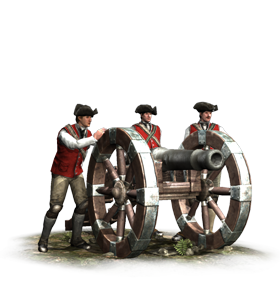Difference between revisions of "Demi-Cannons (ETW Unit)"
m (→Factions) |
m (→Factions) |
||
| (2 intermediate revisions by the same user not shown) | |||
| Line 40: | Line 40: | ||
*[[Image:Hungary_FlagETW.png|25px]] [[Hungary (ETW Faction)|Hungary]] | *[[Image:Hungary_FlagETW.png|25px]] [[Hungary (ETW Faction)|Hungary]] | ||
*[[Image:Ireland_FlagETW.png|25px]] [[Ireland (ETW Faction)|Ireland]] | *[[Image:Ireland_FlagETW.png|25px]] [[Ireland (ETW Faction)|Ireland]] | ||
| + | *[[Image:KnightsHospitaller_FlagETW.png|25px]] [[Knights of St. John (ETW Faction)|Knights of St. John]] | ||
*[[Image:Louisiana_FlagETW.png|25px]] [[Louisiana (ETW Faction)|Louisiana]] | *[[Image:Louisiana_FlagETW.png|25px]] [[Louisiana (ETW Faction)|Louisiana]] | ||
*[[Image:Mamelukes_FlagETW.png|25px]] [[Mamelukes (ETW Faction)|Mamelukes]] | *[[Image:Mamelukes_FlagETW.png|25px]] [[Mamelukes (ETW Faction)|Mamelukes]] | ||
*[[Image:Mexico_FlagETW.png|25px]] [[Mexico (ETW Faction)|Mexico]] | *[[Image:Mexico_FlagETW.png|25px]] [[Mexico (ETW Faction)|Mexico]] | ||
| − | |||
*[[Image:NaplesSicily_FlagETW.png|25px]] [[Naples & Sicily (ETW Faction)|Naples & Sicily]] | *[[Image:NaplesSicily_FlagETW.png|25px]] [[Naples & Sicily (ETW Faction)|Naples & Sicily]] | ||
*[[Image:NewSpain_FlagETW.png|25px]] [[New Spain (ETW Faction)|New Spain]] | *[[Image:NewSpain_FlagETW.png|25px]] [[New Spain (ETW Faction)|New Spain]] | ||
*[[Image:Norway_FlagETW.png|25px]] [[Norway (ETW Faction)|Norway]] | *[[Image:Norway_FlagETW.png|25px]] [[Norway (ETW Faction)|Norway]] | ||
| + | *[[Image:Ottoman_flag.jpg|25px]] [[Ottoman Empire (ETW Faction)|Ottoman Empire]] | ||
*[[Image:ItalianStates_FlagETW.png|25px]] [[Italian States (ETW Faction)|Italian States]] | *[[Image:ItalianStates_FlagETW.png|25px]] [[Italian States (ETW Faction)|Italian States]] | ||
*[[Image:Savoy_FlagETW.png|25px]] [[Savoy (ETW Faction)|Savoy]] | *[[Image:Savoy_FlagETW.png|25px]] [[Savoy (ETW Faction)|Savoy]] | ||
Latest revision as of 14:50, 13 July 2020
 A demi-cannon is a heavy artillery piece from the previous century, deployed in a fixed battlefield position.
A demi-cannon is a heavy artillery piece from the previous century, deployed in a fixed battlefield position.
Overview
Although obsolete, a demi-cannon is still a dangerous weapon to face as it fires a ball with a nominal weight of around 24 pounds. This large caliber makes for a large weapon with a massive gun carriage. Once properly emplaced, a demi-cannon is hard enough to adjust for aim, let alone drag to a new location! Originally, this lack of tactical mobility was not a problem, as the gun was for siege work or for a battlefield where there was little artillery present. It was unlikely to ever suffer any kind of counter-battery fire, so didn’t need to be moved.
Artillery was sometimes incredibly dangerous to its users as well as the targets: fire was a terrible risk. The artillery baggage train usually held an enormous quantity of powder, and any stray spark was liable to cause an explosion. Anyone out of place caught near the powder train could expect little mercy: some generals ordered that enemy agents should be burned alive if caught in an arson attempt, and immediate lynching for their own errant soldiers wandering too near the artillery train!
Details
Demi-cannons are slightly superior to sakers. Other than that, they are identical. They should be utilized early to provide rudimentary artillery firepower to the battlefield, and then replaced with more suitable options.
Factions
 Great Britain
Great Britain United Provinces
United Provinces Austria
Austria Bavaria
Bavaria Dagestan
Dagestan Gran Colombia
Gran Colombia Courland
Courland Denmark
Denmark France
France Genoa
Genoa Georgia
Georgia Greece
Greece Hannover
Hannover Hessen
Hessen Hungary
Hungary Ireland
Ireland Knights of St. John
Knights of St. John Louisiana
Louisiana Mamelukes
Mamelukes Mexico
Mexico Naples & Sicily
Naples & Sicily New Spain
New Spain Norway
Norway Ottoman Empire
Ottoman Empire Italian States
Italian States Savoy
Savoy Poland-Lithuania
Poland-Lithuania Portugal
Portugal Prussia
Prussia Quebec
Quebec Russia
Russia Saxony
Saxony Scotland
Scotland Spain
Spain Sweden
Sweden Thirteen Colonies
Thirteen Colonies United States
United States Venice
Venice Westphalia
Westphalia Württemberg
Württemberg
